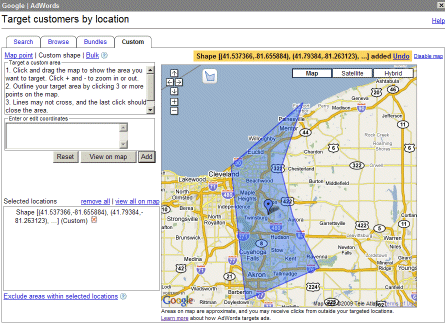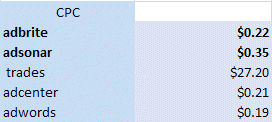 Radio Industry Sells Ads - Advertisers Buy Response
Radio Industry Sells Ads - Advertisers Buy Response
|
 |
If a tree falls in the forest and nobody hears it, it still fell. If Local Search grabs an increasingly larger share of local advertising dollars and the radio industry doesn't pay attention to it, radio ad revenues still decline.
So goes a logical jump to my recent conversation with another radio general manager. "What would you do?" was the question. There was no doubt that this manager was nervous about declining revenues. He has no hope that doing things the same way is going to counteract a downward trend. This person, though, is still looking for answers using a radio mind. There is little chance of rebuffing a direct attack from new weapons when using the same old defensive armor. You're going to get shot up. End of story.
The radio industry is being shaken. Downsizing is the action du jour; unfortunately, educating oneself about new competition is not. Today we see dozens of articles in radio industry trades about radio generating more revenue through the action of selling more ads online - but this is a singular revenue source that doesn't have the capacity to lift radio more than a couple of notches.
What are radio industry leaders missing? Here's a simple answer: the amount of business being lost simply cannot be made up by offering clients just one more option, i.e., advertising on a station web site.
If given the opportunity, I would increase the number of revenue streams that a radio station depends on. This goes far beyond merely running banner ads on a web site, or adding audio ads in a radio station's stream.
While there are more answers than what follows, the very first thing I normally suggest to any radio manager is that they study the landscape. Yet, I find this not being done with any frequency. For example: Do you use Google News as a source of your education in new media? Is Google News even on your list of web sites visited? Are you aware that by going there you can type in a keyword, like "radio industry," and find all the news articles that seem to be of importance to anyone leading a radio station in an increasingly competitive environment? I use "seem to be" because if you do this one action, you'll find how little is being done to lift radio out of this state of depression. Few stories appear under the keyword "radio industry" at Google News. There's a tremendous lack of innovation to move radio forward. That's your first clue something is amiss.
I have a routine for explaining the nuances of new media to old radio types. It steps them through a series of items that comprise today's competitive landscape.
Local Search is not something that's going away, but you'd be surprised at how many people in a position of leadership in radio don't have any idea of the lengths that Local Search can be used to super-serve their current clients. Here's the example I use to drive this point home.
 |
At right is a map of a Google Local Search ad placement. It shows how radio advertisers can place their ads with much more geographic precision than any radio station offers. This particular search placement shows that only persons living on the East side of Cleveland and Akron will see ads I buy on Google. (Yahoo! Merchant Solutions and MSN's AdCenter also offer this specificity.)
Here's another chilling fact. Google is in the process of bringing this exact form of placement to audio ads delivered by internet radio.
What I am not seeing, or hearing, from any manager in radio is the importance of such precise ad buys relative to the shotgun approach offered by radio. This tree fell a few years ago. Did you hear it fall? Nobody that I know of in the radio industry is acknowledging that it did.
My suggestion is, and always has been, that radio offer a Google AdWords buying service to advertisers who see value in this platform.
|
 |
Notice how the blue area covers only the densely populated areas of Cleveland and Akron, and that the ads for this campaign will only be shown to persons who live within these boundaries.
 |
After showing an inquisitive radio manager the above, I'll next prompt them to look at what's below. (This is only one element in an online tracking program, out of dozens used to assess advertising effectiveness.) The conclusion is ad rates are falling, fast.
 |
Here's the setup. This chart demonstrates the payment in a cost-per-click environment. If you shrug off this form of payment for advertising, you can stop reading now. Nothing will change your mind that paying for response is where advertisers are turning today. You're destined to be wondering why you're out of a job in another 2 years.
|
 |
 |
But if you are willing to admit that radio is now selling advertising against a competitor that only charges when an audience member takes action on an ad, then study what this small chart means. The first two items are online ad networks that I bought. The last two are search engine keyword ads. The middle item - "trades" - represents how radio typically charges for an ad. Radio managers place a price on their advertising based on what THEY FEEL it is worth. The exact dollar value doesn't matter, but the differentials do - a great deal.
Based upon $20,000 spent in advertising (this is from a real campaign), an analysis of what each ad vehicle cost boils down to paying an average 20-cents per response using search engine keyword ad buys (last two), and 28.5-cents for each response using an online ad network (top two); that center figure is the average price paid for response when advertising in radio industry trade magazines (which establish price using the same criteria as radio managers do). In all cases, I am buying the same audience.
If you were a business owner faced with making a decision on where to spend your limited advertising budget, which would you choose?
Radio is far from dead; but its lethargic response to an increasingly powerful competitor means that the radio industry will see a continued downward spiral unless additional revenue streams are found. Sticking with only selling ads is not an option.
Each of the above items can be offered to current radio clients for a fee, even though it costs nothing - zero - for a station to implement these services.
So, how do you go about adding these new revenue streams? By spending time learning how advertising is now being bought, and hiring a person to activate these forms of campaigns for clients of yours who are moving radio ad dollars to accountable advertising.
The tree fell. Local Search is growing.
As long as radio continues to insist that it reaches the local population with no adjustment in proving that its audience is reaching back, there's trouble ahead. You simply can't fight this new advertising weapon with the same old radio industry ad buys. Old armor is no longer effective. Precision ad placement with accountable advertising response will beat you every time.
There's no reason why radio industry managers can't offer this new service to clients, today. Though, if managers fail to make this move, that tree might as well drop square on their heads.
 |
From: Kevin Childs
Audio Service America
Thanks once again, Ken. You always make me think....and I hope that your message will reach the lords on high of the dying broadcast radio industry. Now, if we could just get CC (and its cohorts) to actually allow a local station to be a local station, I would die with a smile. |
 |

|
 |
|


 About
About


 Contact
Contact


 Indie Artists
Indie Artists


 Radio Stations
Radio Stations


 Audience Data
Audience Data


 Privacy
Privacy



|
|
 |
|
 |
 |